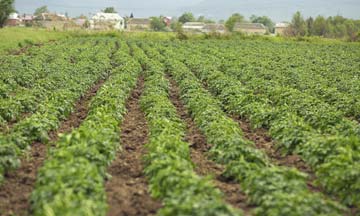New Delhi, 01st October 2021:ASSOCHAM organized a Webinar on Biofortification: A path to Sustainable Nutrition on October 1, 2021, in association with HarvestPlus& GAIN. A knowledge paper, prepared by PwC on “Integrating nutrient rich crops into the food system: A tool of change” was released during the session by our Chief Guest, Dr. S K Malhotra, Agriculture Commissioner, Ministry of Agriculture & Farmer’s Welfare, Govt. of India.
The session focused on the significance of biofortification in fighting hidden hunger, creating awareness about biofortified crops, understanding the relationship between biofortification and other methods of food enrichment, and understanding the agricultural benefits of biofortified crops.
The welcome address and the context setting was done by Mr. Vivek Chandra, Co-chair, Food Processing Council, ASSOCHAM & CEO – Global Branded Business, LT Foods and the Inaugural session was graced by the presence of Dr. S K Malhotra, Agriculture Commissioner, Ministry of Agriculture & Farmer’s Welfare, Govt. of India, Mr. Vivek Arora, Principal Lead, Food Fortification and Research Centre- FSSAI, Dr.Binu Cherian, Country Director, HarvestPlus, Mr. Ajay Kakra, Executive Director, Agriculture and Natural Resource, PwC, Mr. Ravinder Grover, Programme Lead, CBC- HarvestPlus and Mr. Ishank Mikhail Gorla, Programme Lead, CBC – GAIN.
Dr. Malhotra appreciated ASSOCHAM ‘s effort for organising the session. During his address, he said food & nutritional security is the core of a nation's growth and it can be linked to income security as well. He aligned nutritional security with the SDG’s set by the UN that aims to eliminate malnutrition by 2030 but emphasised that the pathway to reach this goal is still not well defined. Various strategies have been devised to overcome this burden of malnutrition and biofortification will provide nutritionally rich crop varieties, which is the need of the hour He recommended that, it is important to do a nation-wide analysis for area-wise nutrient deficiency to have a robust assessment system for biofortified crops for human health. This will help determine the type of biofortified variety required in specific areas. ‘He also mentioned that the soil also determines the nutrition in the plants as the micronutrients present in the soil and their efficient absorption effectively increase their nutrient content. He emphasized the need for branding for biofortified varieties and nutrient based label claim on the products. Another recommendation was the developed varieties need to be studied from an agronomy and soil science point of view to harness additional micronutrients into the agriculture products. He mentioned that India has taken a lead in promoting millets a rich source of nutrition it will guide the world. He also mentioned that the year 2023 will be recognised as the International Year for Millets.
Mr. Vivek Arora greeted all the dignitaries in the inaugural session and started his address by mentioning the importance of micronutrients for functionality of the human body. Recent studies have shown that there is a reduction of these micronutrients in the food nowadays due to various reasons like soil pollution, increasing CO2 levels etc. Some nutrients have become public health concern in India. To replenish these micronutrients in food there is a fortification and it has been adopted in 1953 with the fortification of vanaspati in India. In 2016, FSSAI came with the regulation to fortify 5 staples to cover in nutrient gap in the country that included, salt, milk, rice, oil and flour. He emphasized that fortification is a complimentary strategy which is easy, cost effective and provides benefits to large scale population like oil goes to 98% of the households in the country ensuring its reach to masses. He iterated that this strategy can be adopted at scale. He mentioned the challenge that when compared, oil and milk have more organised market then wheat flour, wheat in itself is difficult to fortify as compared to rice. So, when looked upon the available alternatives there is biofortification which is gaining popularity with the advancement in technology. Crops like wheat that are difficult to fortify can be biofortified pre harvest. This mass strategy of fortification can be extended to biofortification and be used to reach the most vulnerable population. With this pandemic the efforts to alleviate malnutrition have been pushed behind and biofortification along with fortification can be an effective way to bring things back on track in long run and eradicate the micronutrient deficiency from the country.
Post the release of the knowledge paper, Mr. Ajay Kakra gave insights about the publication and mentioned the 2 key recommendations that focus on integrating farmer groups and farming communities and commercialisation of the biofortified crops. The first recommendation given is integrating the farming groups and the ways to scale up the use through policy and other intervention so that it become mainstream from their perspective as well. The second recommendation was regarding the commercialisation of the crops which includes adoption of the biofortified varieties by the mainstream food processors and the ways these crops can become main stream right from the small millers in the villages to large branded players.
Mr. Ravinder Grover, HarvestPlus& Mr. Ishank Mikhail Gorla, GAIN gave a joint presentation on the Commercialisation of Biofortified Crops Programme. The presentation gave an insight on the global health crisis surrounding hidden hunger and Mr. Grover mentioned that primarily low and middle-income countries do not get enough essential vitamins and minerals (micronutrients) in their daily diets. This condition is called hidden hunger. He explained why biofortification could be a game changer and how it can be a good approach to reach the rural poor who rely heavily on locally produced staple foods as their primary source of nutrition. He emphasized that biofortification stands out as is sustainable, and cost-effective approach as after the initial development and dissemination is completed, recurring costs of maintaining production of biofortified crops are low. The CBC program (Co-led by GAIN and Harvest Plus) covers all the aspects of the commercialization of Biofortified Crops right from seed production, marketing and distribution, demand creation & awareness, advocacy and supply chain solutions. Their goal is to expand coverage of biofortified nutrient dense foods to at least 190.6 million consumers by 2022 in Bangladesh, India, Kenya, Nigeria, Pakistan and Tanzania. The program approach is to increase participation and capacity of existing value chain actors of staple crops in the production & processing and demand creation & marketing of biofortified seeds, grains and food products. Mr. Gorla mentioned that they are adopting new innovative aggregation models to ensure an effective supply of biofortified produce to food processors and millers so that it can reach the end consumer through retailers. He said that if we nudge the value chain and make it more focused towards the consumers, 4 impact pathways have been designed. He also mentioned the challenges that included lack of awareness, price, appearance, not suited to the taste of the consumers, sporadicity and adulteration.
After the Inaugural session, the agenda had 2 technical sessions that focused on Improving the scale and access of Biofortified crops and the Commercialisation of biofortified foods. Dr Binu Cherian, Country Director, HarvestPlus and Ms. Bhuvaneswari Balasubramanian, Senior Technical Specialist – Knowledge Leadership, GAIN were the moderators for the 2 sessions respectively.
We saw the presence of industry experts and very eminent speakers for the both the sessions that included Ms. Parikrama Chowdhry, Lead - Impact Evaluation and Partnerships, Syngenta Foundation, Mr. Milind P. Kulkarni, Senior Scientist (Cereal Crops), Nirmal Seeds, Mr. Prabhat Labh, CEO, Grameen Foundation in the first session and Dr. Bhavna Sharma, Head- Nutrition Science, ITC Foods, Dr. Dinesh Chauhan, VP, DeHaat, Ms. Jenny Walton, Senior Specialist, Demand Creation and Business Development, HarvestPlus in the second session. Success stories by farmers growing biofortified crops were also shared at the end of the technical sessions.












.jpg)
